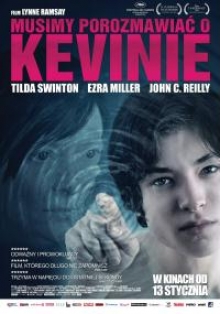Musimy porozmawiać o Kevinie
Mateusz Hasiński
Student Instytutu Filologii Angielskiej Uniwersytetu Wrocławskiego (pod kierunkiem dr Justyny Deszcz-Tryhubczak)
„Musimy porozmawiać o Kevinie” jest adaptacją książki napisanej przez Lionel Shriver, nakręconą w 2011. Film opowiada o tragedii, która dotknęła rodzinę Khatchadourianów. Opowiada o niej z perspektywy matki, Evy Khatchadourian (w tej roli Tilda Swinton), wziętej pisarki-podróżniczki, próbującej nawiązać więź ze swoim synem. Jednak Kevin (w roli nastoletniego Kevina Ezra Miller) od samego początku filmu ignoruje ją, a wręcz czyni jej życie nieznośnym. Jest to szczególnie widoczne w scenach, w których obecna jest Eva, a chwilę później pojawia się Franklin (John C. Reilly), który do samego końca nie był świadomy, kim naprawdę był Kevin, ponieważ ten w obecności ojca zawsze był wzorowym chłopcem.
Film jest dramatem psychologicznym zawierającym w sobie elementy thrillera. Pełen jest wspomnień, które wyjaśniają obecne położenie bohaterki. Widzimy ją w nich szczęśliwą, biorącą udział w festiwalu La Tomatina. Później dowiadujemy się, że jest w ciąży. To znacząco zmienia nastrój tych wspomnień: w trakcie ciąży Eva wygląda na smutną. Wyraźnie pogłębia się to krótko po porodzie. Widzimy, że Eva nie jest szczęśliwa, ale stara się kochać swojego syna i wkłada dużo wysiłku, żeby nawiązać z nim więź. W rzadkich momentach, w których Kevin udaje, że zależy mu na matce, widzimy subtelne ruchy mięśni na twarzy Evy – była autentycznie szczęśliwa, że polepsza się relacja między nią a synem (świetna gra aktorska Swinton), aż do momentu, w którym Kevin zdeptał te nadzieje.
Film nie opowiada historii Kevina, a jego matki. Opowiada historię ciągłej walki, jaką stało się jej życie, kiedy zaszła w pierwszą ciążę; udręki życia w jednym domu z Kevinem, potrzeby kochania go i bycia kochaną. Jednakże relacja między Kevinem a Franklinem jest zupełnie inna. Spędzają razem dużo czasu, bawiąc się. Ojciec uczy Kevina, jak strzelać z łuku, co ostatecznie prowadzi do jego śmierci (w pierwszej scenie z łukiem, Kevin strzela w okno pokoju, w którym siedzi Eva, trafiając dokładnie w miejsce, w którym znajduje się jej twarz, co zapowiada nadchodzącą tragedię).
Film jest bardzo cichy; niewiele w nim muzyki. Sceny rozwijają się powoli, co pokazane jest za pomocą długich ujęć. Tonuje to tempo filmu i zwiększa napięcie odczuwane przez widza. Często pojawia się w filmie kolor czerwony. Morze pomidorów na La Tomatina, puszki zupy pomidorowej w supermarkecie, czerwona farba na domu Evy i zmywanie jej ze ścian i podłogi, po czym zmywanie jej z rąk. Czerwony kolor zdecydowanie symbolizuje jej poczucie winy z powodu tego, co zrobił jej syn. Eva próbuje zmyć z siebie tę winę. Będąc stale nawiedzaną przez wspomnienia, próbuje znaleźć odpowiedź na pytanie „dlaczego”, które zadaje Kevinowi w ostatniej scenie filmu. Daje tym samym przykład matczynej miłości, nie przejmując się tym, co zrobił jej syn. Wreszcie udaje się jej go pokochać.
„We Need to Talk about Kevin” is a movie adaptation of a book written by Lionel Shriver, directed by Lynne Ramsay in 2011. The movie presents a story of the tragedy that happened to the Khatchadourian family. It does so from the point of view of Eva Khatchadourian (amazing performance by Tilda Swinton), a renowned traveller and writer, who, as we can see throughout the movie, tries to bond with her son. However, Kevin (played by three different actors, with the final performance by Ezra Miller) from the onset of the movie seems to be bent on ignoring her or even making her life miserable. It is especially visible in the scenes where both Eva and Kevin’s father, Franklin (John C. Reilly), who, as we see, was, until his very end, never aware of Kevin’s true nature, are interacting with Kevin, his stance towards them is strikingly different.
The movie can be classified as a psycho drama, interweaved with thriller elements. The narrative is full of flashbacks that tell us the backstory of the protagonist’s current misery. We see her happy, being part of La Tomatina. Then she discovers she is pregnant. This changes the mood of the flashbacks as during her pregnancy she seems depressed. The state deepens after birth, but Eva tries to love her son, and every time we see her put a lot of effort to connect with him. On rare occasions when Kevin pretends to care about her (except for Kevin being sick, there are 2 situations like that, I believe), we can see subtle twitches on her face. Eva is genuinely happy and hopeful that the relation with her son is changing until her dreams fall apart each time, and yet she tries.
In my opinion, the movie does not tell the story of Kevin, but of the mother herself and the struggle with what her life has become when she first became pregnant with Kevin – the misery and torment of life with Kevin, trying to love him and to be loved back. The relation between Kevin and his father, however, is of a different sort. They spend a lot of time together and have fun. Franklin teaches Kevin to shoot a bow, which ultimately leads to his death (the first scene, in which Kevin shoots an arrow into Eva’s window, hitting exactly where her face was, foreshadows the future tragedy).
The movie is quite silent. The scenes are long, with long frames, which slow the movie down and increase the tension. There is also a lot of red in the movie – tomatoes at La Tomatina, cans of tomato soup in the supermarket, the red paint on Eva’s house and her cleaning it and washing it off her hands. The red colour clearly symbolizes her guilt over what her son has done, but again, we see the movie from her perspective. It is she who feels guilty for what her son did and tries to clean the blood off her hands. As Eva is haunted by memories, she tries to find an answer to the question she asks in the final scene „why?”, showing us an example of motherly love oblivious to what her son has done. She finally loves him.

